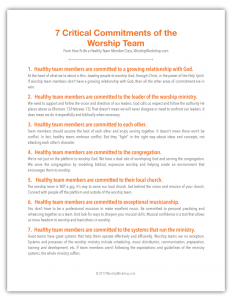How does a worship team measure success? What does winning look like?
For some worship teams I’ve led, we asked, “Did we avoid a train wreck?” If the answer was yes, that Sunday landed in the “win" column.
Avoiding a mid-song meltdown is a good thing. But once you move past mere musical survival, what does success look like?
Some would say excellence.
Unfortunately, measuring excellence for the worship team is subjective:
- Did I worship well?
- Did I do a good job inviting and encouraging others to worship well?
- Did I have musical and technical…awesomeness?
Measuring our success is tough. But measuring our failure? That's easy:
- My head was stuck in my music stand the entire set.
- She closed her eyes the whole time and ignored the congregation.
- He botched two transitions.
- You fumbled the words on that verse.
- I came in late on that bridge.
It’s tough to improve when you’re chasing some vague notion of “excellence” with no tangible milestones to gauge progress. And, “Try not to suck," is not an excellence-inspiring goal.
But think about this: If I’m trying to lose weight, what’s my measure of success?
The numbers on the scale.
The fit of my fat pants.
The number of my chins.
Now, if I’m serious about losing weight, those can’t be the only things I measure. Those are known as “lag measures.” They show up after I’ve done the work. I can’t stand on the scale and will it to read my college-freshman-year weight.
What determines the scale numbers are other numbers:
The kettlebells I swing.
The amount of water I drink.
The carbs I consume.
And the late night snacks I avoid or devour.
Those numbers, in goal setting terms, are called “lead measures.” Lead measures are what you can influence and predict.
If I hork down two Big Macs and a strawberry milkshake several times a week, that's predictive behavior of a severe muffin top.
So what if, instead of just relying on our typical post-service excellence-analysis, worship team members and leaders started measuring the behavior that produces excellent worship leadership on the platform.
I’d like to suggest the behavior we start to measure is engagement.
 Here at WorshipTeamCoach.com and at WorshipWorkshop.com, we teach that worship team members need to engage in seven critical commitment areas. (Email matt@worshipteamcoach.com to receive your free PDF with these 7 Critical Commitments.) >>
Here at WorshipTeamCoach.com and at WorshipWorkshop.com, we teach that worship team members need to engage in seven critical commitment areas. (Email matt@worshipteamcoach.com to receive your free PDF with these 7 Critical Commitments.) >>
But there are three engagement/commitment areas that we can hone in on which will both predict and influence successful platform leadership:
1. ENGAGING WITH GOD.
If this area of commitment and engagement isn’t happening, forget about it. Everything else is in vain.
I’ve had too many seasons where I looked good on the Sunday stage but wasn't worshiping God off-platform. Jesus had some choice words for people like me (Matthew 23).
Remember this: Our platform worship will never exceed our private worship.
2. ENGAGING THE CONGREGATION.
Lead worshipers, just like the Old Testament priests, have a dual role of worshiping God and serving the people. Too many worship team leaders and members on the platform close themselves off physically and relationally from the congregation they’re supposed to be leading.
3. ENGAGING WITH THE MUSIC.
Engaging with the music involves everything from learning and practicing it (before rehearsal, please), rehearsing it as a team, and then playing/singing/mixing it on Sunday.
So as I close up this article here, let me give you a few “lead measures” for successful worship in each of these engagement areas. As a team, talk about how you can work at these and hold each other accountable to these lead measures, as well as others that you come up with.
Engaging With God:
- A daily practice of creating space to worship God and allowing Him work in me.
- Worship with the same enthusiasm on the Sundays I’m off the platform as I do on.
- Practice community and accountability with a few trusted friends.
- Intentionally create space the night before services to prepare spiritually.
Engaging With The Congregation:
- Prepare my music to the point where I can be free to express worship (and engage something other than my music stand).
- Intentionally practice good platform presence during rehearsals and run-throughs.
- Watch videos of previous services to assess my platform presence.
- As a team, plan out how each song should “look.”
- Spend time getting to know and love the people of the church that I’m leading.
Engaging With the Music:
- Listen to the music…a lot.
- Learn my songs before rehearsal.
- Arrive at rehearsals and soundchecks before the posted start time.
- Listen to and interact musically with the other vocalists or band members.
- Spend that extra time between rehearsal and the service to internalize the songs.
So just imagine if your team got intentional about measuring these things. Not only will it transform your worship ministry, but probably your entire church.
I’d call that a win.
This article first appeared in the January 2018 Issue of Worship Musician Magazine. Check out more "better by Sunday" articles from [WM].
Stuck?
Learn how to level-up your team with this free video training.







